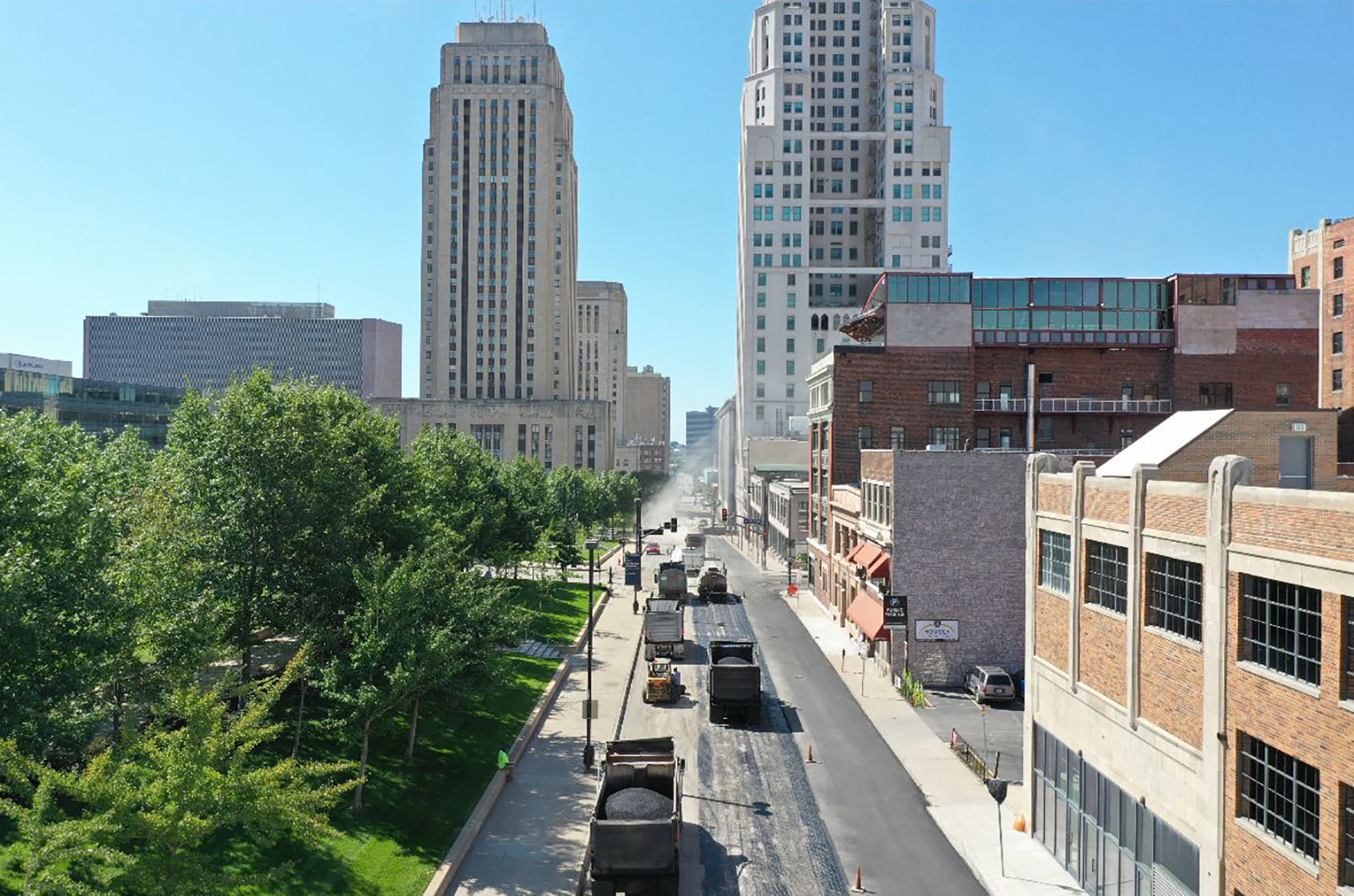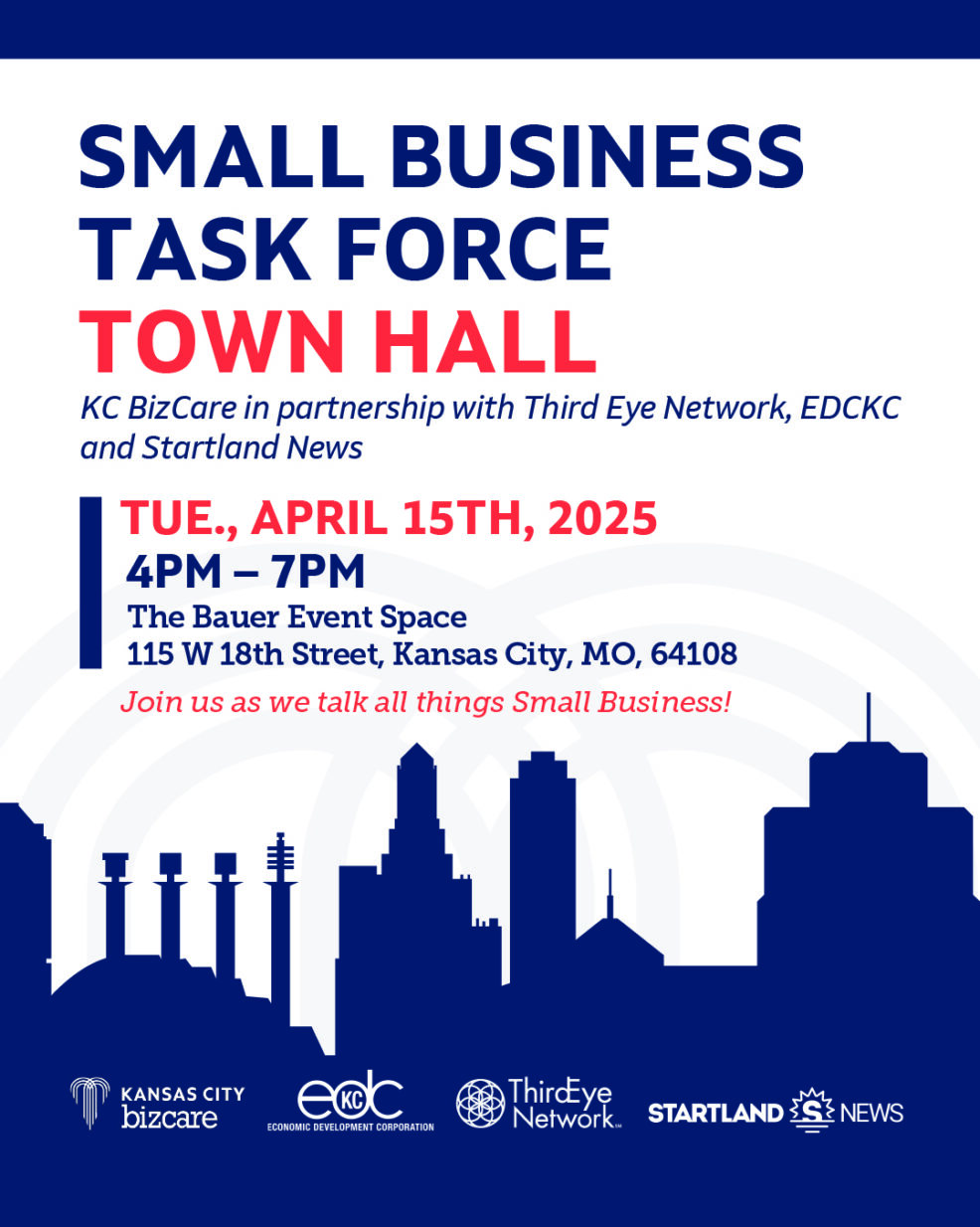Three years of working and waiting might be headed to an impasse for entrepreneur support advocates who’ve been lobbying the City of Kansas City, Missouri, for renewed — and dramatically enhanced — funding to boost startups and small businesses battered by the pandemic.
Mayor Quinton Lucas and City Manager Brian Platt submitted to the city council a fiscal year 2022-2023 budget that continues significant improvements to essential services such as street repair and resurfacing, cleaning up trash and litter, and snow removal, while also making key investments in emphasizing public safety through community policing, affordable housing, public safety, and energy efficiency and sustainability initiatives.
Click here to read more about the city’s budget priorities.
“Everywhere we go, we’re asked ‘Kansas City is supposed to be the Most Entrepreneurial City in America. What all are they doing to help lift you all up? Create connections for you? Help you all build into major companies?’” said Eze Redwood, a serial entrepreneur who spearheaded the advocacy effort, which also includes a cross-section of leaders from the startup and small business communities. “Do you know how embarrassing it is to have to tell them that the city isn’t prioritizing us or putting their money where their mouth is?”
The loosely-organized group requested $11 million in funding from KCMO’s $1.9 billion 2022-2023 budget through public testimony, as well as in a formal letter to city council members. City leaders have given no indication they’ll amend the budget in response to the plea for greater entrepreneurial support funding, as outlined by the group.
The council is expected to vote on the budget by Thursday, March 24. [Update: KCMO approved its nearly $2 million budget Thursday. Click here to read more from KCUR, a member of the KC Media Collective alongside Startland News.]
Click here to read the letter sent by Redwood to the city council on behalf of the entrepreneur and small business community, detailing their argument for funding.
“In most cities, the city itself is leading the way through public-private partnerships, direct support in entrepreneur support organizations, even entire departments within the city whose sole job is getting visibility and growth for their businesses,” Redwood told Startland News. “They’ve already done the math and realized that the more they invest the more it pays them back in multiples. And to be honest, that is why our economy as a city has fallen behind all of our peer cities. We no longer lead the pack, quite to the contrary, our GDP has fallen significantly in comparison to the national average and our peer cities.”
“Everyone has figured out that investing in our small businesses pays off for their economy — everyone except Kansas City, Missouri.”
The city has emphasized its focus on infrastructure improvements in the new budget — priorities Redwood said can remain without cuts to KCMO’s existing plans for public safety, affordable housing and neighborhoods efforts.
“We do indeed have the excess money,” Redwood said of the city’s finances, noting unallocated funds from previous years and an expected tax increase. ” … We are extremely confident that the $11 million can be sourced without displacing any of the initiatives represented in this upcoming year’s budget.”
Representatives from the city did not offer a direct response to the $11 million request when contacted by Startland News, but detailed ways KCMO already is working to invest in small business support in innovative ways, they said — largely through regulatory changes and a stronger KC BizCare Office.
[Editor’s note: KC BizCare is a financial supporter and programmatic partner of Startland News.]
KC BizCare streamlines the process of starting a small business by helping entrepreneurs navigate city permitting, zoning, licensing, procurement, certification, and other government mandated requirements to operate a business.
“The KC BizCare Office is drafting requests to the State ($TBD) and City ($5 million) for American Rescue Plan funding to create a city-led small business fund that will create new avenues for driving public funds to support BIPOC businesses in Kansas City,” said Maggie Green, KCMO media relations manager. “The fund would help small businesses and local entrepreneurial support organizations (ESO) to build capacity through job creation, production space, purchase equipment and technology, materials and supplies.”
“The city already has an existing Access to Capital support model … that has helped local Black and minority owned businesses access close to $2.5 million in SBA and local relief capital,” she continued, referencing programs specifically designed to aid with Paycheck Protection Program access. “This program was done in partnership with the Prospect Business Association and the Heartland Black Chamber and was financially supported by the Economic Development Corporation of Kansas City, KCSourcelink, UMB Bank and the City of Kansas City.”
Among other existing or new tactics from KCMO, according to Green:
- The Street and Sidewalk Café program which launched at the start of the pandemic waived permit fees and eased requirements to make it easier for businesses to add outdoor dining space. “We have heard anecdotally from participating businesses that the added outdoor dining space was critical to their survival during the pandemic,” Green said.
- The city also passed a to-go liquor sales policy early in the COVID pandemic as another way to support small business and keep commerce flowing through these businesses during this difficult time.
- A floor amendment allowed for a more streamlined process to sell/transfer an existing business from one owner to another owner, specifically pertaining to taverns/nightclubs.
- The KC BizCare Office is making a $500,000 budget request to increase its investment capacity working with entrepreneurial support organizations to provide technical support for business planning, certification/contract prep, and access to capital.
- KC BizCare has also built its capacity to now offer services and support in Spanish, through its new hire Samuel Morris, and is looking to expand its small team to provide more support services to local small businesses.
“BizCare is great,” Redwood said Tuesday in a message to supporters of the $11 million funding effort. “But they are tasked with serving 3,000 new businesses registering with them every year, plus 5,500 businesses requesting help with accessing and understanding city functions, regulations, or taxes. Their cases can be quite complex and take a significant amount of time. By some miracle, they have been able to manage 1,100 cases-per-person and the 3,000 new business registrations, hand-holding & processing, all while also coming up with new ways the city can help our businesses last longer (and better engage with the city).”
“The office is currently performing miracles, however we cannot continue to under-resource them and fail to provide the matching funds they need to accomplish meaningful work,” he continued, encouraging advocates to push for greater funding for KC BizCare as well. “Their department makes the city money — we have to treat it as such and give them what they need.”
Pandemic punch
The city’s 2022-2023 proposed budget jumps from $1.73 billion to $1.9 billion because of available federal COVID relief funds — precisely the reason Redwood and the group see room for KCMO to step up its funding, he said, especially after years of cuts to support that began after Quinton Lucas was elected mayor in 2019.
“The conversation started under [former city manager] Troy Schulte,” Redwood said, referencing budget talks that began in the runup to the 2020-2021 budget (and pre-dated the pandemic’s arrival). “We then had a series of meetings following the finance/budget office’s initial recommendation of $11 million that were supportive of our efforts, however, we were told that we would have to wait a year since the first round of American Rescue Plan funding was going to go to stabilizing city accounts.”
“Our view is that small businesses cannot wait any longer. Every day we wait, more small businesses are shutting their doors,” he continued. “We took the city at its word, and if the city does not follow through when they are getting $200 million free [from the federal government], and when we are contributing hundreds of millions to a budget that is spent on absolutely everything except us — hiring citizens no one else will, working with neighborhoods, and returning 4-to-1 return on investment — then that presents a major violation of trust and a defunding of our sector.”
Among the group’s plans for the $11 million detailed in its request:
- $4.5 million — Grants to small businesses impacted by COVID
- $1 million — Loan loss reserve fund to enable $6 million in loans to small businesses for job creation
- $1 million — Small business back office support (leveraging economies of scale)
- $4.5 million — Grants to entrepreneur support organizations helping to build small businesses
A key argument for funding advocates: Many small businesses and entrepreneurs slipped through the cracks of previous relief efforts — some anticipating more assistance was on its way, said Simone Curls, executive director of the Prospect Business Association.
“Most believe, in my opinion, that the Paycheck Protection Program, for example, was a catch-all solution for businesses during the height of the pandemic, but the reality was PPP had its flaws,” said Curls, another organizer of the advocacy effort. “Don’t get me wrong, PPP did help some, but not all. The amount of a PPP loan was based on one’s taxes. This was not the type of loan where one walks into a financial institution requesting a specific loan amount to be utilized however one desires.”
In addition, the initial PPP formula excluded, for example, businesses with 20 employees or fewer, sole proprietors, 1099 workers, and self-employed entrepreneurs. Other challenges included some businesses lacking relationships with financial institutions, the understanding and support needed to apply, and the technology to assist with completion of applications and other required documents within the banking portals, Curls added.
“I believe 100 percent that the city owes it to its small businesses who have been fighting against the odds to keep their doors open and maintain jobs throughout the pandemic,” Redwood said. “For many it was our darkest hour, and when we look around we don’t see anyone from the city there to help! We have held the city down providing hundreds of millions in tax revenues for the city for decades, but where is the city to hold us down when we need it?”
Looking inward and outward
While the city is channeling much of its entrepreneur and small business support through the KC BizCare Office, those efforts are much more broad than some might imagine, Green said, noting a new emphasis on cross-border collaboration and prioritizing small businesses for local procurement contracts with its certified businesses.
“Through a premier partnership between the sister cities, the City of Kansas City — through its KC BizCare Office — is currently working in partnership with the Unified Government for Wyandotte County to remove barriers and create greater access to contract opportunities across the region for small local businesses,” Green said.
“Kansas City is also making improvements and investments to ensure the procurement process is inclusive — another important piece of small business support. That includes minority, women, disadvantaged and small local businesses in and around Kansas City,” she continued. “There are close to 700 certified small businesses with the City of Kansas City. Currently the city’s certification is accepted by other government offices that include Jackson County, Kansas City Public Schools, and the Kansas City Area Transportation Authority.”
The city is also participating in the City Innovation Ecosystems (CIE) program at the National League of Cities (NLC) to identify critical issues facing government departments and agencies and creating public processes for remediation by partnering with civic minded startups, Green said.
“Challenge-Based procurement gives opportunities for the city to become more innovative in our work,” she said. “It also creates opportunities for gov-tech businesses to work with the City of Kansas City.”
Redwood agreed with the value of looking to other cities and ecosystems for innovative ideas — specifically pointing to efforts in Overland Park and Topeka, Kansas, Nashville and Chattanooga, Tennessee, Buffalo, New York, and Austin, Texas.
But those examples all lead him back to the same central theme, he said: invest in the entrepreneur support organizations that get in the weeds with small businesses to mentor them, work through challenges, put in processes for them, and help them reach success.
“Maybe it’s just our optimism, but we as a small business and entrepreneur community prefer to think that the city just hasn’t done the math yet,” Redwood said. “Because the alternative is that they don’t care about us, refuse to prioritize those of us who are building neighborhoods, creating 70 percent of the net new jobs, and are fine letting us die … along with the household income for all of the families we support.”









































